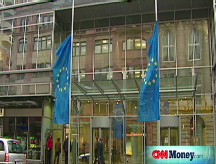Dollar rises as Europe falters
Investors flock to dollar as world economy continues to crack.
NEW YORK (CNNMoney.com) -- The dollar climbed against the 15-nation euro and the British pound Friday, as fears of a major economic recession were rekindled by a dismal U.S. retail sales report and announcement of a euro-zone recession.
Investors sought the shelter of the U.S.-backed dollar, sending the euro down 1.7 cents to $1.26 from $1.277 on Thursday.
The dollar also rose against the pound, which fell 1 cent to $1.474 from $1.484. For the past several days, the pound has been trading at levels not seen since June 2002. But the greenback fell ¥0.68 against the Japanese yen to ¥97.03 from ¥97.71.
"Its a reminder of how challenging the economic circumstances are going to be," said Nick Bennenbroek, chief currency strategist with Wells Fargo.
Retail sales: According to the U.S. Department of Commerce, retail sales fell 2.8% in October, the largest percentage monthly drop on record, and worse than the 2.1% decline predicted by analysts.
The retail report confirmed statements made this week by major retailers such as electronics seller Best Buy (BBY, Fortune 500), whose chief executive called the months since September "the most difficult climate we've ever seen."
Equities: The poor retail report helped drive down stocks Friday, which bolstered investment in the dollar.
The direction of the dollar has been tied to equities over the past week as investors use the stock market to judge the longer-term outlook for the economy, according to Bennenbroek.
In general, as stocks have risen and investors became a little more positive, the value of the dollar declined. But as stock market losses mounted, the value of the dollar has risen as investors shifted to the U.S.-backed currency.
On Friday, the dollar got a boost as the Dow Jones industrial average was driven lower by both the retail sales report and job-cut announcements from major companies such as Sun Microsystems (JAVA, Fortune 500).
The Dow recovered some of its losses by mid-day, taking the edge off the dollar's rise against the euro, and actually reversing the dollar's position against the pound, but the dollar regained its strength again as the the Dow closed down nearly 4%.
Europe economy: Meanwhile, the economy of Europe continued to crumble, with the European Union saying the overall economy of the 15 euro nations slipped 0.2% in the third and second quarters.
The decline puts the region into a technical recession, which is loosely defined as two consecutive quarters of negative growth.
Weakness in Europe increases the likelihood that the European Central Bank will cut its key interest rate.
The ECB cut its interbank lending rate 0.5% last week to 3.25% (compared to the Federal Reserve's 1% rate).
The Bank of England has been more aggressive in cutting rates since the nation's economy started to recede. The central bank cut its interest rate by 1.5 percentage points to 3% last week, and it hinted Wednesday that it may cut rates further at its December meeting.
"Clearly the situation has been bad for some time," said Bennenbroek. "A lot of analysts would be expecting that interest rates in Europe and the U.K. [could fall to] between 1% and 2% by early 2009," he added.
The outlook for the world economy looks bleak as a group of 20 major world leaders, including U.S. President George W. Bush, meet in Washington to discuss global economic policies.
However the combination of an out-going presidential administration with a lack of global consensus on economic issues may hinder any decisions made at the meeting, said Brian Dolan, chief currency strategist at online currency trading Web site Forex.com.
"It's difficult for them to agree on the same things and on doing it all in a unified fashion," said Dolan. "The real clincher is that the U.S. is holding an empty deck of cards with the current administration," he added. ![]()




